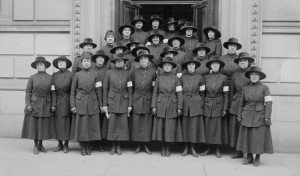Hello Girls of World War I
Tuesday, March 8th, 2016March 8, 2016
Since 1913, today, March 8, has been International Women’s Day, a part of Women’s History Month. The day is a time to reflect on the progress of women’s rights and of the ending of discrimination against women, and the celebration of women’s achievements and acts of courage and determination. As part of International Women’s Day, today we look at the American “Hello Girls” of World War I.
In 1917, United States troops began shipping out to France in large numbers to fight in World War I. After years of warfare, the French telephone service—still a fairly new technology at that time—was struggling, and few operators spoke English. To improve communications, the U.S. Army Signal Corps created its own telephone system. In November 1917, the Army asked for American women who spoke French to serve in France as operators. At that time, nearly all telephone operators were women.
Thousands of American women responded to newspaper ads asking for operators to serve overseas. The Army chose 450 women for special training with rugged field telephones and switchboards and other military technology. The women also received basic military training. A first group of 33 women shipped to France in March 1918. Women began operating Army switchboards throughout the American lines, which included many dangerous spots in combat zones.
By war’s end in November 1918, 223 women had served overseas as “Hello Girls” (a dated colloquial term we would not use today). Many of these women then served with occupation forces in Germany or remained in France until the end of peace talks in June 1919. Thousands of other American women served the war effort in France as nurses, clerks, drivers, and many other important occupations.
After the Hello Girls returned to the United States, the women were considered civilians working for the Army and denied veteran’s status, including medals and benefits. For decades, legislation to right this wrong stalled in Congress. Finally, largely through the tireless efforts of one Hello Girl from Montana, Merle Egan Anderson, Congress awarded veteran’s status to the operators in 1978, 60 years after the end of World War I.
Other link




